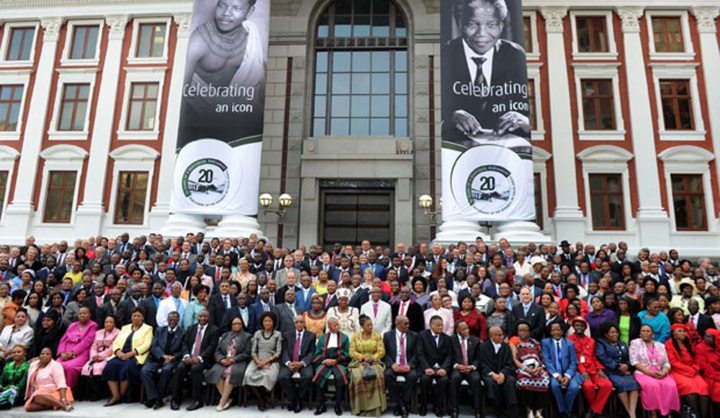Politics, South Africa
Union vs Parliament: ‘No option but to render the institution ungovernable’

Five months after last year’s unprotected strike by the National Education, Health and Allied Workers’ Union (Nehawu) at Parliament, labour relations at the national legislature remain terse. On Wednesday Nehawu called for the departure of Secretary to Parliament Gengezi Mgidlana, whom it accused of bad faith in facilitation before the Commission of Conciliation, Mediation and Arbitration (CCMA), and failing to fully implement what had been agreed in 2015. By MARIANNE MERTEN.
Late last year Nehawu Members at parliament downed tools over performance bonuses and conditions of service. Across the parliamentary precinct echoed “ePalamente sifuna imali. Asonwabanga!” (Parliament, we want money. We are not happy”) and on 10 November 2015 police fired stun and multicoloured smoke grenades at strikers. Following an interdict obtained by Parliament in mid-November the protests were relocated outside the locked gates to Parliament. On 5 December 2015 a return to work agreement was signed, which undertook not to victimise the strikers but did not rule out disciplinary action, while also enforcing the no work, no pay rule from February 2016.
Five months later, there has been little if any movement. Mutually-agreed facilitation before the CCMA has yet to resolve a number of issues, including why bonuses were not paid to 480 qualifying Nehawu members. The trade union is also angry that the reversal of February’s no work, no pay deductions and the suspension of state security vetting under a CCMA-facilitated agreement have not been implemented. This apparent failure appears to be in contradiction of a written undertaking given to the union by Parliament’s human resources executive Lizo Makele in a memo dated 18 March 2016, seen by Daily Maverick.
On Tuesday 10 May Nehawu returns to the CCMA over what it calls the “unilateral” redetermination of performance assessments by Parliament’s administration. It is understood a number of these assessments on which bonuses are determined were remarked downwards, leaving a number of Nehawu members disqualified from bonuses.
Attempts to obtain timeous comment from Parliament proved unsuccessful.
Nehawu president Mzwandile Makwayiba and deputy general secretary Zola Saphetha this week returned to Cape Town to take up the grievances of its largest branch in the Western Cape. Nehawu represents about 981 of Parliament’s 1,389-strong workforce, including junior managers, white-collar workers in the committee, documents and translation services and those cleaning and catering staff not outsourced.
The level of frustration over lack of progress in the CCMA facilitation, initially expected to end in late March, was palpable as both national office-bearers indicated the union’s proposals for flexibility had been simply rejected by Parliament’s administration. They blamed Mgidlana for the impasse in effectively implementing the agreements signed last year.
“There are numerous failures of this management by Mr Mgidlana to implement the collective agreement,” said Makwayiba. “There will never be stability in that place (Parliament) as long as we have that (man). Our call is that man must be totally removed.”
He later told Daily Maverick that he had met on “more than one occasion” with Parliament’s presiding officers, whom he believed were not adverse to settling the matter properly. “The blockage is at the level of implementation. There’s no way the presiding officers would want to deliberately undermine (the process).”
Amid various “apartheid divide-and-rule tactics”, Nehawu on Wednesday said Mgidlana had threatened junior managers that they could not belong to the union, and of underhandedness in implementing a unilateral salary increase regimen outside of the agreed consumer price index (CPI) plus 3%.
The salary increase dispute, in particular, highlights an interesting approach by Parliament to its collective bargaining agreement undertakings. The June 2015 multiterm substantive agreement in clause 3.2 states that the salary increases for the 2016/17 financial year would be the consumer price index (CPI) “as determined by Statistics South Africa” plus 3%. In March 2016, Statistics South Africa said CPI stood at 7%, and with the salary increases effective from 1 April 2016, Nehawu expected a 10% increase. However, on 7 April Makele wrote to Nehawu (the memo was seen by Daily Maverick) saying a 9.4% increase was due, based on a calculation of 6.4% average CPI based on several banks’ predictions, plus 3%.
Nehawu is disputing this interpretation of the salary increase agreement. It also wants a full investigation into the overseas trip by Mgidlana and three top administrators to three parliaments, saying the Secretary to Parliament should have been at the CCMA to resolve the labour stalemate.
That study tour to the parliaments of the United Kingdom, Scotland and Turkey, as part of a benchmarking exercise, had “sidelined” the union, which according to the March 2015 agreement should have been part of any benchmarking exercise with regard to the total cost of employment reviews. The union also raised questions over the accuracy of the report on the trips, an unsigned and undated document recently circulated to all staff.
And so Nehawu has given Parliament 14 working days to respond to its request for an investigation into Parliament’s overseas trips, and the outstanding labour issues, before it embarks on another strike.
“Failure to secure a quick response favourable to our members in particular and workers in general, the union shall be left with no option but to render the institution ungovernable and service unworkable,” said Sapetha.
This action would spread nationally to provincial legislatures, effectively putting the matter of a legislature collective bargaining chamber back on the front burner. It was first raised during last year’s unprotected strike as several provincial legislatures came out in support of their colleagues at the national legislature.
Parliament effectively closes for a two-and-a-half month “constituency period” from 19 May until after the 3 August local government elections. But, Nehawu said on Tuesday, this would not hamstring the union from rolling out a national programme of action. DM
Photo: Family photo of Members of Parliament outside Parliament in Cape Town, 21 May 2014. (Photo: GCIS)





 Become an Insider
Become an Insider